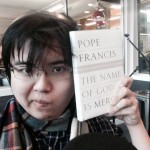!['Supply warehouses and dock facilities at this important east coast port feel the destructive weight of para-demolition bombs dropped from Fifth Air Force's B-26 Invader light bombers. Wonsan, North Korea. Air Force.: ca. 1951' - by USAF (photo 306-PS-51(10303)) [Public Domain - U.S. Government work], via Wikimedia Commons](https://wp-media.patheos.com/blogs/sites/721/2016/08/Korean_War_bombing_Wonsan-1024x825.jpg)
For this, we have to look to yet another presser, this time the one from when he was leaving from his visit to Korea. While answering a Japanese journalist’s question about the Korean ‘comfort women’ forced into sexual slavery during World War II, as well as the long persecution of Japanese Christians by the imperial government, Francis says:
You have gone back to one of the first questions. Koreans are a people who have not lost their dignity. As a people, they were invaded, humiliated, they experienced wars, now they are divided, with great suffering. Yesterday when I went to the meeting with the young people, I visited the Museum of the Martyrs. It is terrible, the suffering which those people endured, simply for refusing to trample on the cross! It is an historic pain or suffering. This is a people with the ability to suffer, and this too is part of their dignity. Today, there were these elderly woman present at Mass. To think that in that invasion they were carried off as young girls into barracks to be used… And they did not lose their dignity. Today they were there, as elderly woman, the last ones remaining… [Koreans] are a people secure in their dignity. But turning to these instances of martyrdom and suffering, and these woman: these are the fruits of war! Today we are in a world at war everywhere! Someone told me, “You know, Father, we are in the Third World War, but it is being fought “piecemeal”. Do you understand? It is a world at war, where these acts of cruelty take place. (In flight press conference of Pope Francis from Korea to Rome, 13 August 2014, emphasis mine).
Francis doesn’t tell us who first used the word ‘piecemeal’ with him, and he doesn’t say where he heard it. However, his take-off point for talking about the piecemeal third world war is Korea, where – just after the experience of Japanese colonization – ‘now they are divided, with great suffering.’ This division is one wrought by war; in fact, the endurance of the Demilitarized Zone (DMZ) between the two Koreas since the 1953 armistice means that the Korean War never ended, suggesting that the state of war existing between the Republic of Korea and the Democratic People’s Republic of Korea is also part of the piecemeal third world war.
Here is where conversations with my student Eugenia Geisel – the same one who made the comments about sacramental ontology at World Youth Day – have been brilliantly helpful. Eugenia’s public persona is that of an emerging Catholic intellectual, but she is also a Korean major at the University of Washington’s Jackson School of International Studies, as well as a minor in Comparative Religion (my fault) and Russian and Slavic Literature (not my fault). In a discussion on the Korean War that we had in the class that I taught on Trans-Pacific Christianities, Eugenia quite helpfully nudged me to talk about communism and capitalism in the Asia-Pacific as ideological geographies in between which persons get caught, especially Christians whose theologies fit awkwardly with both systems. In South Korea, the minjung theologians of the 1960s and 1970s called the experience of this ideological oppression han (恨 for my Chinese readers), the deep-seated interiorized anger bottled-up in the oppressed that has potential for a massive release. Han, the minjung theologians often point out, is an oppression that is usually related to the trauma of violence in war.
Call me an Asian and Asian American religion nerd, but when Francis says ‘piecemeal third world war,’ I think he’s really talking about han. What this means, though, is not that Francis is an Asian and Asian American theologian in his own right. Instead, it means that the history of the ‘piecemeal third world war’ probably precedes even the Korean War, especially if Francis lumps the comfort women into the equation.
What that calls for is an even closer look at what Francis characterizes as the piecemeal third world war.












